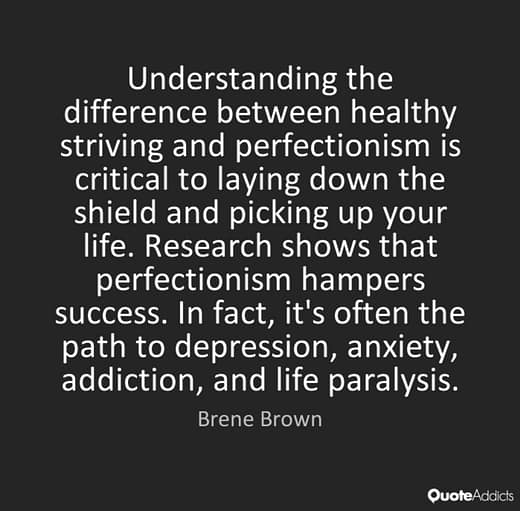How do I overcome perfectionism?
Understanding perfectionism on a deeper level
Social researcher, Brené Brown has studied perfectionism and it relationship with vulnerability and shame. Here are Brené’s definitions of what perfectionism is and is not:
- Perfectionism is a self-destructive and addictive belief system that fuels this primary thought: If I look perfect and do everything perfectly, I can avoid or minimize the painful feelings of blame, judgement, and shame.
- Perfectionism is an unattainable goal. It’s more about perception than internal motivation, and there is no way to control perception, no matter how much time and energy is spent trying.
- Perfectionism is addictive, because when we invariably do experience shame, judgement and blame, we often believe it’s because we weren’t perfect enough. Rather than questioning the faulty logic of perfectionism, we become even more entrenched in our quest to look and do everything just right.
- Perfectionism actually sets us up to feel shame, judgement and blame, which then leads to more shame, judgement and blame: It’s my fault. I’m feeling this way because I’m not good enough. (See also Harvard Medical School psychologist Susan David’s tips for stopping destructive self-talk)
And, here’s her take on what perfectionism is NOT:
- It’s not striving for excellence. It’s not about healthy achievement and growth. Perfectionism is a defensive move.
- It’s not the self-protection we think it is. It’s a 20 ton shield we lug around, thinking it will protect us, when in fact it’s the thing that’s really preventing us from being seen.
- Perfectionism is not self-improvement. Perfection is, at its core, about trying to earn approval. Early praise for achievement and performance has become a dangerous and debilitating belief system: “I am what I accomplish and how well I accomplish it, please, perform, perfect, prove.”
- Perfectionism is not the key to success. In fact, research shows perfectionism hampers achievement and is correlated with depression, anxiety, addiction and life paralysis, or missed opportunities. The fear of failing, making mistakes, not meeting people’s expectations, and being criticized keeps us outside the arena where healthy competition and striving unfolds.
- Lastly, perfectionism is not a way to avoid shame. Perfectionism is a function of shame.
Check out Brené Brown’s Ted Talk on Vulnerability:
Brené Brown: The power of vulnerability | TED Talk
To learn more about how to overcome perfectionism and live a wholehearted life, check out “The Gifts of Imperfection” by Brené Brown available online or at your favorite book store!
